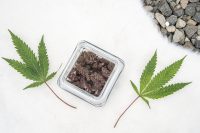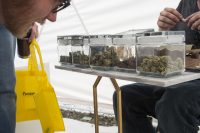Cannabis businesses encounter a variety of problems when hiring and managing employees. Some of those are issues that every business runs into and some of them are quite specific to the cannabis industry. Chris Cassese, co-founder and managing director of Faces Human Capital Management, has some solutions for cannabis businesses facing seemingly daunting workforce management issues.
 Cassese co-founded Faces HCM with Caela Bintner after two decades of working in the human resources and sales strategy across a variety of financial institutions. He oversees software platform development, daily operations, sales, and business development for their organization. Before co-founding the company, Cassese held a variety of operational and product development roles during his ten-year tenure at Merrill Lynch, worked in marketing at HSBC and was a sales and performance advisor at Insperity, a professional employment organization. Faces HCM is a professional employment organization that handles workforce compliance, education, and other HR needs for cannabis companies. They work with companies like Dixie Elixirs, LivWell and Women Grow, among other cannabis businesses.
Cassese co-founded Faces HCM with Caela Bintner after two decades of working in the human resources and sales strategy across a variety of financial institutions. He oversees software platform development, daily operations, sales, and business development for their organization. Before co-founding the company, Cassese held a variety of operational and product development roles during his ten-year tenure at Merrill Lynch, worked in marketing at HSBC and was a sales and performance advisor at Insperity, a professional employment organization. Faces HCM is a professional employment organization that handles workforce compliance, education, and other HR needs for cannabis companies. They work with companies like Dixie Elixirs, LivWell and Women Grow, among other cannabis businesses.

According to Cassese, the cannabis industry faces a roughly 60% turnover rate, which is on par with the turnover rates in retail and call centers. Those are industries that typically have high turnover rates simply because the nature of the business. However, Cassese says it doesn’t have to be so high for the cannabis industry. “It is easy to say it is just high turnover by nature, but we found there are some steps that we can put in place that seem relatively easy, but are key tenants of Fortune 500 companies’ hiring strategies,” says Cassese. “Engaging in a needs-based analysis with companies will help us figure out exactly what’s going on.” They start by looking at the onboarding process, or what happens immediately after an employee is hired. “We start by looking at their pay rate, employee handbook and the paid time off policy, which are some of the points that a lot of the owners are familiar with coming from other high-end industries outside of cannabis.” He says things like swag bags, free ski passes after reaching quotas and other perks can keep employees engaged on the team. “Things like that go a long way and can reduce turnover by up to 20 or 30 percent,” says Cassese. “Sometimes [business owners] are so stressed with regulatory compliance that they don’t have time to tackle these issues so employee dissatisfaction often starts with onboarding procedures.” That can include anything from analyzing the overall compensation structure to making a video displaying the company’s vision, mission and values. “There is no panacea for reducing turnover. It requires conducting a needs-based assessment, taking pieces of what we know works well in other companies and bringing that to the cannabis industry.” Making an employee feel like they are part of the team can help boost retention and keep turnover low.
One area they often help companies with is performance reviews. “Performance reviews are a big part of any business,” says Cassese. “You can’t make progress if you don’t know where you’re going. If you don’t know how you’re doing you can’t get better.” Looking at the supervisor level, they have often found employees have never given a performance review before. “We implement processes to teach them how to deliver positive or negative performance reviews and help make them feel comfortable delivering that,” says Cassese. They might have employees perform a DISC analysis (dominance, influence, steadiness and conscientiousness), a personality test akin to the Meyers-Briggs test. “From this we can help figure out the stressors and motivators of people and create effective teams,” says Cassese. “If an employee might be more outgoing or humble, high-spirited, results-oriented, analytical or good working on teams.” These are approaches to workforce management that have been adopted from Fortune 500 companies.

Cassese says one of the most overlooked items for companies are proper I-9 verification forms. This goes back to basic record keeping and documentation, but if overlooked, companies can get hefty fines for improper record keeping. “You are supposed to have a separate binder, in a separate locked drawer where your I-9 forms are housed, but a lot of people don’t know about that, which could come back to bite them in the form of large fines” says Cassese. “Businesses can’t afford to have sloppy record keeping. We help businesses take a look at their process and how they put their files in the cloud or physical locations, which is an area where companies often need guidance.” Civil fines can reach up to $20,000 for mistakes on I-9 forms.
Employee education is another crucial aspect of managing the workforce. Faces HCM has a learning management system that gives companies the ability to push education to their employees. Education is of course a broad term and can cover a wide variety of needs for employees. “We can help them take leadership, teamwork, excel, OSHA, safety classes and more,” says Cassese. “Training that shows you active listening, empathy skills and other types of training can really help budtenders deal with customers appropriately.” They have developed customized training programs for cannabis companies expanding beyond their own state too. “As you find certain cannabis companies growing in different states they want to create a repeatable, consistent and predictable experience,” says Cassese. “Putting those standard operating procedures online is important to streamline the process and ensures that you are creating a learning or education plan to meet your employees’ needs.” That can look like requiring employees to take an online course once every quarter, or offering them books on subjects pertaining to their specific job function.
Little things like improving the employee experience, implementing an education program and keeping up with employee records can make or break a business. They all add up to solid workforce management, which if done correctly, can enhance a business’ bottom line and keep employees working for you.






















 According to Tyler Dautrich, co-founder of Greenhouse Ventures, Lindy Snider is an extraordinarily valuable asset. “Lindy has been essential in the early success that Greenhouse Ventures has experienced to date and we are fortunate to name such an active and respected member of the investment community as our lead advisor,” says Dautrich. The company will be hosting two ten-week semesters in February and September every year. Applicants that are accepted into the program typically receive an average of $60,000 in professional services in exchange for a minor equity stake in their venture. Those accepted applicants are not required to relocate, as virtual participation is available.
According to Tyler Dautrich, co-founder of Greenhouse Ventures, Lindy Snider is an extraordinarily valuable asset. “Lindy has been essential in the early success that Greenhouse Ventures has experienced to date and we are fortunate to name such an active and respected member of the investment community as our lead advisor,” says Dautrich. The company will be hosting two ten-week semesters in February and September every year. Applicants that are accepted into the program typically receive an average of $60,000 in professional services in exchange for a minor equity stake in their venture. Those accepted applicants are not required to relocate, as virtual participation is available.



